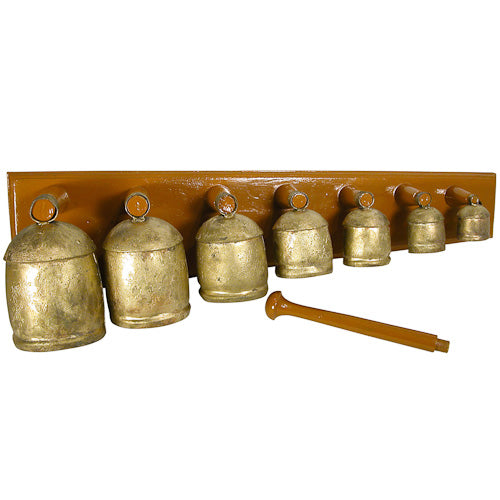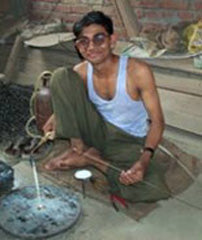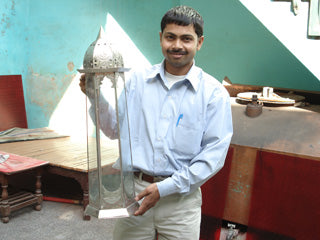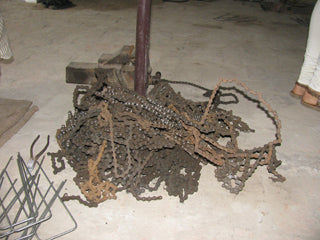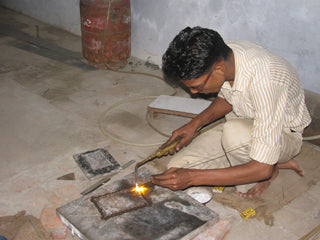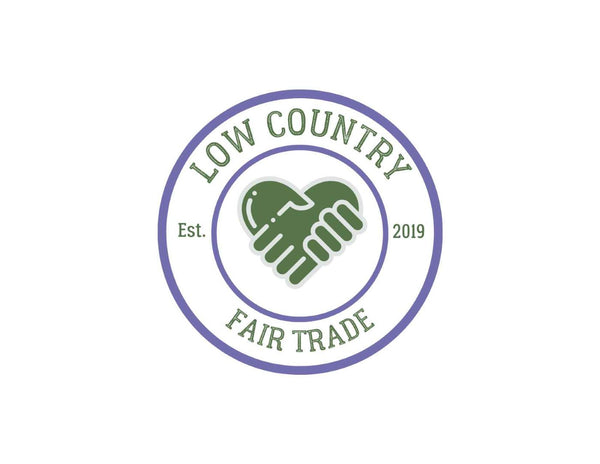OWP
Metal Bell Xylophone Instrument- Fair Trade- India
Metal Bell Xylophone Instrument- Fair Trade- India
No se pudo cargar la disponibilidad de retiro
A traditional xylophone, with origins in Africa and Asia, consists of wooden bars of varying lengths with each bar tuned to a specific musical scale. This interesting variation contains bells in various sizes mounted on a wooden board that sits on a flat surface to play. The bells differ in size and scale so each of them will produce a different sound when they are hit with the wooden mallet.
This xylophone, made mostly from recycled scrap metal, is handcrafted by metal artisans at a Noah's Ark workshop in Moradabad, India. Moradabad is one of the largest metal-producing cities in India, well known for its high-quality metal craftsmanship.
- Measures 6” high x 26-1/2” wide x 7-1/2” deep
- The wooden mallet is 8-3/4” long
Handmade in India and fair trade imported.
Hailing from the Western Indian towns of Kutch and Gujarat, these metal bells were traditionally made for cattle, with different sizes and tones to help herders identify their animals. The artisans, descendants of the Lohar caste which originated in Pakistan, have been making bells for as far back as they can trace their ancestry. These days, bells are made using iron scraps that are salvaged from junkyards and then hand-pressed into a variety of shapes and sizes, just as they have been for the past 1,000 years.
After achieving their shape, the bells are covered with powdered copper and mud paste and then baked in a furnace for a rustic finish. The entire process generates a minimal amount of waste, just small traces of metal scrap and burnt mud, and because they’re not welded, a very small amount of energy
About the Artisans:
This item was handmade in India in a workshop sponsored by Noah’s Ark, an NGO that offers funding for raw materials, machines, and workshop repairs to 100 artisan groups across India. In exchange for assistance, workshops must prove that all employees are paid fair wages for their products and work in safe and clean conditions. Noah's Ark also offers free classes in capacity building to its network of 600 artisans, a rigorous quality control check, and runs education and water sanitation projects to benefit the artisans’ children and the rest of the community. The company has established 20 new workshops in the past 15 years, and all employees are paid 10-15% above the local rate.
To learn more, click on "About the Artisans" below.
Share
About the Artisans
About the Artisans
Kamrool Hassan es un artesano del metal de Moradabad, ciudad situada al norte de la India. Ha estado asociado con el Arca de Noé durante más de 15 años. Perteneciente a una familia tradicional de trabajadores del metal, Kamrool comenzó su carrera profesional fabricando puertas, barandillas y rejas de ventanas metálicas para hogares. Durante generaciones, sus antepasados pertenecieron a la comunidad de herreros y se sabía que fabricaban utensilios de latón y cobre para las familias reales mogoles. Moradabad es el centro metalúrgico del país y es conocido por su producción de artefactos de latón y metal. Noah's Ark trabaja con varios artesanos en Moradabad y sus alrededores, que producen productos únicos que atienden a los mercados nacionales e internacionales.
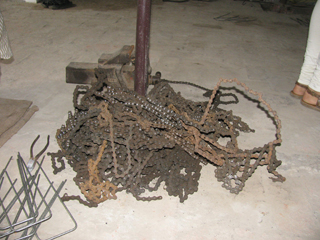
Kamrool tiene un pequeño taller que proporciona ingresos sostenibles a otros cinco artesanos; cada uno participa en el proceso de clasificar, romper y soldar las cadenas. El Arca de Noé ayudó a Kamrool a montar un taller para su trabajo en metal. El taller cuenta con la mayoría de las comodidades necesarias excepto el acabado final, que se realiza en otras instalaciones. Kamrool y su grupo de artesanos son expertos en hacer hermosos marcos de cuadros, portavelas, cuencos y otros accesorios con cadenas de bicicletas desechadas. Esta colección es única y da un nuevo significado a la chatarra desechada.
Los artesanos necesitan un suministro sostenible de cadenas de bicicletas desechadas para producir su trabajo; Por lo general, estos provienen del mercado local de chatarra. En momentos en que los pedidos son grandes, necesitan comprar cadenas recicladas en otras ciudades, como Delhi. Una vez adquiridas las cadenas metálicas, se clasifican por tamaño y se enderezan. Luego se seccionan según el tamaño o largo requerido para un producto en particular. Las secciones de la cadena se colocan sobre un marco de metal o un tinte, para asegurar la coherencia en la forma y el tamaño de cada producto, y se sueldan entre sí. Una vez que se les da forma a los productos, están listos para un acabado final; Se limpia el metal y se elimina el óxido y otras impurezas. A continuación, el artículo se pule o se aplica un recubrimiento en polvo según sea necesario. Finalmente, los productos de la cadena reciclados están listos para ser enviados al almacén para su embalaje y envío.
